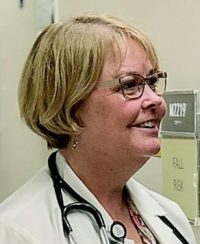
Beth Orrell, a palliative care nurse, pictured in a Sept. 26 photo.
ARLINGTON, Va. (CNS) — Maryel Rodgers sat beside a stranger named Grace.
The woman lay still “under a purple fleece blanket sprinkled with brightly colored hearts and edged with broad fringes,” recalled Rodgers. “Her graying hair spilled across the pillow. Her breath was firm and steady. She seemed to be unaware of the commotion of the busy hospital unit.”
From a poster on the door, Rodgers learned that Grace enjoyed dancing and oldies music. She had a husband and daughter. Grace looked about Rodgers’ own age, and she softly began to speak to the woman about what they might have had in common. Eventually, she had to leave.
“How do I say goodbye? I am looking at you, robed in that soft blanket of royal purple and I think of the woman in the Gospel story who was eager to touch the fringes of Jesus’ garment,” Rodgers wrote in her journal, which was later published in an Ignatian Volunteer Corps newsletter. “Let me now touch the fringes of your garment as you move into eternity. Thank you for your company.”
Rodgers, a parishioner of Our Lady, Queen of Peace Church in Arlington, was one of the first Ignatian volunteers to spend time with a patient in their last moments as part of the No One Dies Alone program at Georgetown University Hospital in Washington.
[hotblock]
For the past two years, when someone in the hospital is dying without family or friends nearby, volunteers have come to spend a few hours by their bedside.
The national program began in 2001 with an Oregon nurse named Sandra Clarke. One day as she started her shift, a dying man asked if she could sit with him for a while. She promised she’d return after she checked on her other patients. When she came back, the man had died. His passing inspired her to begin No One Dies Alone.
Beth Orrell, a palliative care nurse at Georgetown, and her co-worker, Dr. Robin Gross, started the program there.
“I feel very strongly about patient advocacy and I have a tender spot for the vulnerable patient,” Orrell told the Arlington Catholic Herald, newspaper of the Diocese of Arlington. “Georgetown as an institution really values the dignity of every human life. In my work I’m able to uphold that value and it gives me great satisfaction.” The pair called on different churches and groups to volunteer.
The team of about 15 volunteers initially went through training to learn about the dying process, both the physical signs and the spiritual aspects, said Orrell.
There is a regular support group to help the volunteers process the many emotions that can accompany witnessing death. The volunteers usually have a sense of how to be most helpful to the dying person, said Orrell. Some will play music or read poetry or sacred texts. Sometimes they’ll hold the patient’s hand.
[tower]
“I think all of them have learned about themselves and who they are, and I think being able to give a deep human connection is a very satisfying thing,” she said. Each believes in the simple but profound act of accompanying the dying.
The majority of the patients are not alert or awake, said Orrell. Some are weak from having endured a draining illness; some are hooked up to machines. As the outward signs of their humanity diminish, having someone stand watch can restore a bit of the humanity that’s obscured in the dying process, said Orrell.
“The volunteers give back to the staff in addition to the patients. They bring a fresh perspective in terms of us ensuring the patients’ comfort,” she said. “They remind us of the patients’ humanity. It’s always a good thing.”
Some of the patients have outlived family and friends, or have loved ones that live too far away or are too busy to stay at the hospital for long periods of time. In one unusual circumstance, a man was dying of cancer and his wife was in the Intensive Care Unit due to a stress-induced break down. A No One Dies Alone volunteer split her time between the husband and wife. “Families are incredibly grateful that the patient is not alone,” said Orrell.
“I just think that human presence is so important at the end of someone’s life,” she said. “People are not alone when they’re born and they should not be alone when they die.”
***
Maraist is a staff writer at the Arlington Catholic Herald, newspaper of the Diocese of Arlington.
PREVIOUS: Prof who called for senators’ ‘miserable death’ to take leave
NEXT: Courage founder pushed bishops to resist zero tolerance on abuse


Does a program like this exist n the Philadelphia area?